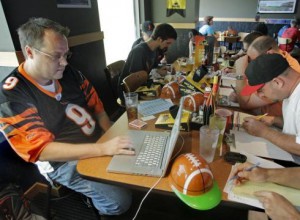New York Attorney General Takes on Daily Fantasy Sports Gambling
Recently, New York Attorney General Eric Schneiderman has decided to take on certain fantasy sports gambling websites, particularly ones that advertise daily games such as DraftKings and FanDuel. As he wrote in an op-ed piece for the New York Daily News, “my job is to enforce the law, without fear or favor. For more than a century, New York laws have banned gambling. The few narrow exceptions that exist – which do not include sports betting – all come with strong regulation and oversight to ensure fairness and protect New Yorkers from fraud.”
A.G. Schneiderman has issued cease and desist letters to stop the flow of money into these websites. Schneiderman contends that daily fantasy sports betting is governed by chance to a degree that makes it illegal under New York and federal laws.
What Laws Regulate the Sports Betting Industry?
In 1996, Congress passed the Professional and Amateur Sports Protection Act (PASPA) to restrict sports gambling to certain states. These states currently include Nevada, Delaware, Oregon, and Montana—and only Nevada hosts serious sports betting. Under PASPA, no government entity can license or authorize any lottery, sweepstakes, or other betting scheme based on competitive games involving amateur or professional athletes. Attorney Generals and sports organizations can use PASPA to remedy violations of the law. 
More recently, in 2006, the Unlawful Internet Gambling Enforcement Act was passed to regulate U.S. banks and other financial institutions. Those institutions are no longer allowed to be involved in online gambling transactions. The law also affected online blackjack, poker, and other similar games. This means that, in general, many of the bets placed and collected online are processed through offshore banks.
State gambling laws may also pertain to fantasy sports betting. As Law Professor Marc Edelman explains, “not every “game for money” or “bet on an uncertain outcome” is defined as illegal gambling” by states. Rather, most states maintain explicit carve-outs that permit certain activities, such as stock trading, that otherwise would seemingly fall under the category of gambling.” This means that there are some forms of fantasy sports competition that fall short of “gambling” under some states’ laws.
Fantasy Sports Betting Today
Fantasy sports betting existed well before the internet was part of our daily lives. However, until recently, fantasy sports games have been played over an entire season. These games have an entry fee to be part of a league, and an annual prize that is awarded to the manager who most skillfully crafts a winning team. In these respects, they are not much different than any other contest. These fantasy games involve commissioners who regulate play, treasurers who handle the financial stakes, and strategic advising companies that help players decide which athletes to choose. Fantasy sports betters can also be insured to cover the losses if one of the athletes on their “team” is injured during the season.
Daily games, however, are much more akin to other forms of gambling. They are short-term and sometimes risky bets based largely on chance and not on talent. In addition, as with all gambling, the house always takes a cut of the winnings. These games may lure gambling addicts and others who care more about the thrill of the bet than sports.
It is estimated by the American Gaming Association that in 2012, only 1% of sports betting ($2.88 billion) happened in Nevada, where it was completely legal. The other 99% of the betting occurs within other states, involves millions of Americans, and is sometimes facilitated by offshore banking. While some betting involves traditional fantasy sports league play or tournaments like March Madness, daily and weekly online fantasy sports betting is becoming increasingly popular.
Should PAPSA and other laws put a stop to fantasy sports betting?
According to Edelman, many fantasy leagues have support from the athletic organizations that they revolve around. Short-term games, however, are more about betting and have usually had less official support. However, the Guardian reported in May that DraftKings has now been declared the “official daily fantasy partner” of Major League Baseball… and that the National Basketball Association now has an equity stake in FanDuel. Despite this trend, in a city like New York where websites like these could stand to make millions of dollars from illegal gambling activities (and from gambling addicts), it may be time to lay down the law.

Comments